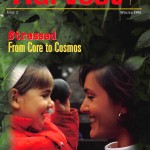My biggest struggle with living overseas goes back to the book of Genesis where the rebellious tower builders started babbling in other languages. When God confused their tongues He did a thorough job!
The results of that confusion caught up with me the day George and I arrived in Brazil to begin our global working careers. How awful for a woman to be robbed of her ability to talk! My unanswered prayer for instantaneous language acquisition was just the beginning of a long story of frustrating experiences with the Portuguese language.
Soon we were in language school where I discovered that—in addition to being unable to speak— I was afraid to try. A voice told me, “If you remain silent, no one will laugh at you.” My perfectionist side said, “Keep quiet until you can say it perfectly.”
Of the six of us in our class, I was the slowest learner. George was the fastest. He was preaching in Portuguese just three months after our arrival. Though couldn’t tell how well he spoke, it sounded good to me. I was happy for him, but oh so disgusted with myself. The woman who asked, “Why are you so dumb that you can’t learn our language?” was of no help. Well, at least George could be my interpreter.
One day we stopped at a downtown shop where a friendly Brazilian salesgirl tried her English on us, “If you speak slowly, I can stand under you.” My laughter after we left the shop was hollowed by the realization that I must have sounded just like that to Brazilians. I began to think I would never learn the language.
Then came a very difficult pregnancy that put me out of language school and into bed for six weeks until the birth of our first child. Steven David lived just five days. Language learning didn’t seem so important then.
It was bad enough that I doubted my language ability, but I also began to doubt my intelligence. I became convinced that I would never have a ministry. For several years, I allowed my fears to stifle the desire I felt to reach people with the gospel.
One day a friend needed encouragement. So I gathered my courage and my daughter, Marci Jo, and together we went to the friend’s home. Once there, I forgot my fears, tried to help and even prayed with her in Portuguese. I felt joy in this, but on the way home, Marci chided, “Mom, your Portuguese was awful!” The next day, however, my friend called to thank me, “It was such an encouragement,” she said, “I’m doing a lot better now.” I needed her encouragement more than she needed mine. Through experiences like that, I began to see that language ability was not the only means of communicating. Love, sincerity, and simple openness went a long way.
One afternoon I needed to buy dishes for our cafeteria. Marcelo, who drove our delivery truck, took me to a discount store where I bought sixty plates and glasses. I was happy for making such a good purchase—until we arrived at another store and found the same dishes for thirty per cent less than I had paid!
“Marcelo,” I said, “we’re going to return those dishes, get our money back, and buy these.”
“Dona Dolly,” Marcelo answered, “in this country you never get your money back.”
“Well, we’re going to try.”
Reluctantly, Marcelo drove me to the first store and waited silently while I spoke with the manager. “Senhor,” I began… I don’t remember what I said after that, but the manager listened patiently and replied, “Senhora, we don’t do this, but here’s your money back.”
On the way out Marcelo was amazed. “Dona Dolly, you have made history in Brazil.” And I had done it in Portuguese!
I wouldn’t call that an eventful day in Brazil’s history, but it was an eventful day in mine. I discovered that by trusting God, by taking courageous steps, by speaking with a sincere, loving heart, I could not only accomplish things, I could impact people’s hearts. Eventually I found that I could serve the Lord effectively and I made many wonderful Brazilian friends who still chuckle with me—not at me—when I make grammatical errors.
Dolly Foster served for twenty-five years with Bethany Fellowship Missions in Belo Horizonte, Brazil.
This article is a classic originally published in our early print magazines.
View the original print magazine where this article was first published.


